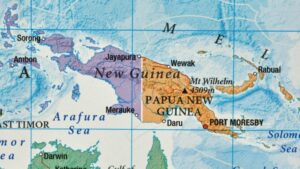Papua New Guinea becomes the latest country to join CBDC push
By Ted Orme-Claye - February 6, 2025; 3 MINUTE READ

The financial authorities of Papua New Guinea are working with those of Japan to create a Central Bank Digital Currency (CBDC) for the Pacific island nation.
Japan’s Ministry of Economy, Trade and Industry (METI) and the Bank of Papua New Guinea announced the completion of a proof of concept (PoC) for a ‘digital Kina’ late last month.
The PoC was completed in partnership with Soramitsu, a decentralised technology company headquartered in Tokyo. Papua New Guinea’s bank states that it has taken notice of global fintech developments, and intends to leverage technological innovation itself for the benefit of the country.
The trio hope that a digital Kina could address financial challenges in Papua New Guinea such as limited access to banking, security vulnerabilities and underdeveloped financial infrastructure.
Bank of Papua New Guinea Governor, Elizabeth Genia, said: “The rationale for the Proof-of-Concept study stems from the rapid advancements in digital financial technologies globally, which have opened up opportunities to enhance payment systems and improve financial inclusion.
“Many Central Banks around the world are exploring digital currencies to meet the evolving needs of the communities we serve.”
Following the PoC, the central bank intends to conduct further testing of a CBDC across a broader user base to gain more feedback and better refine the prospective system.
The bank has plans for a wider rollout in the future, targeting a ‘more inclusive and resilient financial future’.
CBDCs continue to gain traction across the globe, though some countries stand out as being more receptive and having made the most progress. Others have shown trepidation due to concerns around government overreach and personal freedoms.
As it stands, the most notable CBDC rollouts have occurred in Jamaica, the Bahamas, China, India and Russia, all of which are piloting digital versions of their respective national currencies.
Other jurisdictions are probing the possibility of a CBDC, though there is no guarantee these nations will actually launch one.
The Bank of England (BofE) has been probing the idea of a UK CBDC for the past couple of years, while the European Central Bank (ECB) has been doing the same for a digital Euro. In both cases, a launch would depend on the approval of legislators in the form of Britain’s MPs and the EU’s MEPs.
In stark contrast, the world’s largest economy of the US is not overly keen on the prospect of a CBDC.
The Federal Reserve has previously outlined that a digital dollar is not likely anytime soon, and in the first executive order around cryptocurrencies of his second administration President Donald Trump has tasked a working group with assessing how regulation could prevent an American CBDC from being launched.




